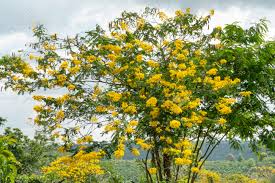Biodiversity & Environment
Kerala to Curb Alien Plants’ Growth
- 02 Jan 2020
- 2 min read
Why in News
The Kerala Government is planning to arrest the rampant growth of invasive plants, especially Senna spectabilis, in the forest areas of the Nilgiri Biosphere Reserve (NBR), including the Wayanad Wildlife Sanctuary.
- Due to mass flowering and drying of bamboo species in Wayanad, lots of open spaces (78.91 sq km) has been occupied by Senna spectabilis.
- The plant has also started to invade the adjacent Bandipur and Nagarhole tiger reserves in Karnataka and Mudumalai tiger reserve in Tamil Nadu.
Senna spectabilis
- Senna spectabilis is a deciduous tree native to tropical areas of America.
- It grows up to 15 to 20 metres in a short period of time and distributes thousands of seeds after flowering.
- The thick foliage of the tree arrests the growth of other indigenous tree and grass species. Thus, it causes food shortage for the wildlife population, especially herbivores.
- It also adversely affect the germination and growth of the native species.
- It is categorised as ‘Least Concern’ under IUCN Red List.
Wayanad Wildlife Sanctuary
- It is part of the Nilgiri Biosphere Reserve along with Mudumalai Wildlife Sanctuary, Bandipur National Park, Nagarhole National Park, Mukurthi National Park, and Silent Valley.
- Wayanad Wildlife sanctuary is significant because of ecological and geographic continuity with other protected areas such as Bandipur Tiger Reserve and Nagarhole National Park, of Karnataka in the north-eastern portion and Mudumalai Tiger Reserve of Tamil Nadu in the south-east.
- It has the world’s largest recorded population of the Asiatic elephant.
- Almost the entire Wayanad district is drained by Kabini and its three tributaries, the Panamaram, Mananthavady, and Kalindy rivers.
- The Kabini River, one of the three east flowing rivers of Kerala, is an important tributary of the Kaveri River.




